Resin-bound gravel stain removal requires prompt action. Tackle oil and grease by blotting with kitchen roll, then scrub using warm, soapy water. Organic stains, such as moss or algae, need a proper specialist cleaner from your local DIY shop. For rust marks, grab a rust remover and treat spots during your regular checks. If cement splashes occur, act immediately with diluted hydrochloric acid, taking proper safety precautions. Keep your driveway in top condition through regular sweeping and occasional pressure washing to prevent stubborn stains from setting.
Key Takeaways
Remove Stains From Resin-Bound Gravel:
- Tackle fresh stains straight away using kitchen roll or cloths to soak up spills before they set.
- For oily patches and grease, mix washing-up liquid with warm water and scrub thoroughly.
- Treat moss and algae with specialist organic cleaner from your local DIY shop to stop them taking root.
- Sort rust marks with proper rust remover like Stontex Rust Off – you’ll find this at most builders’ merchants.
- Deal with cement spills quickly using diluted hydrochloric acid or a cement remover from your hardware shop.
General Cleaning and Maintenance
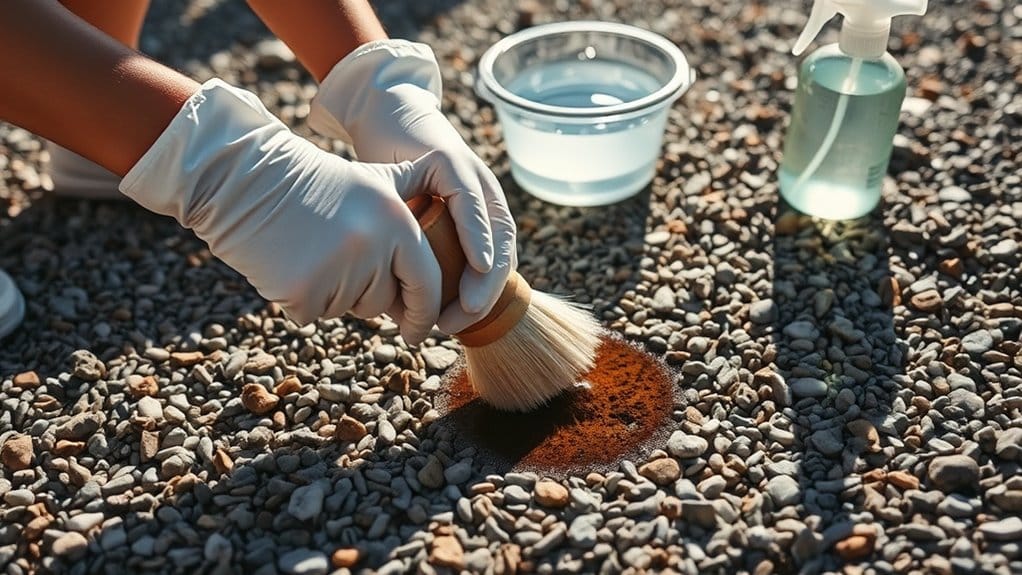
Basic cleaning of your resin-bound gravel is straightforward. Sweep weekly to clear leaves, dirt and loose stones that could damage the surface. A quick spray with the garden hose will wash away any remaining dust – just avoid using pressure washers in cold weather as they may harm the resin. Cleaning your driveway regularly helps maintain its durability and aesthetic appeal. Regular inspections and weed prevention are also essential to keep your gravel surface in top shape. Clean spills like bird droppings straight away to prevent staining. For thorough cleaning, use gentle soap solutions rather than harsh chemicals. Regular maintenance stops moss and algae taking hold, which keeps your surface looking smart and helps it last longer.
Removing Oil and Grease Stains
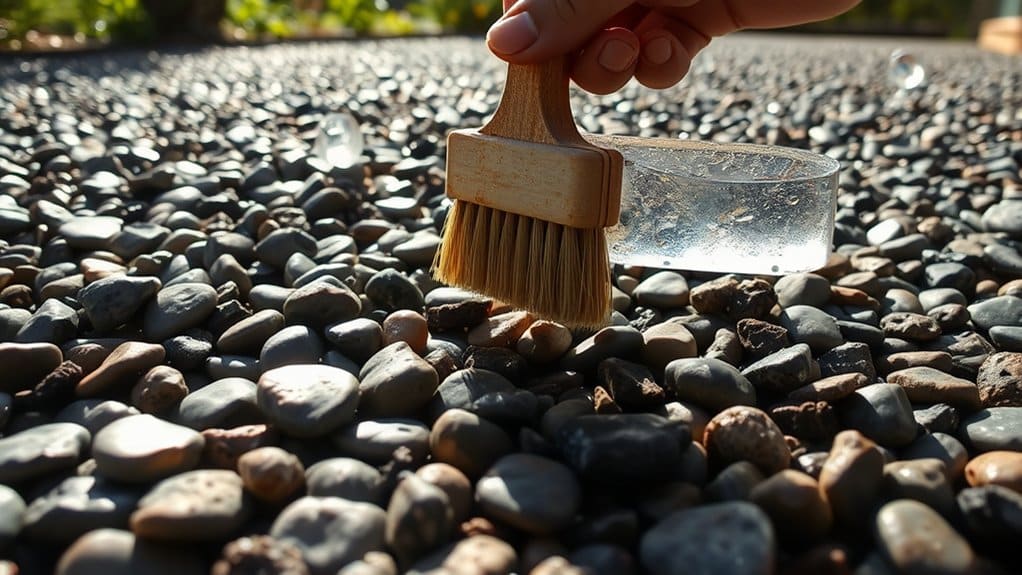
Clean oil and grease stains from resin-bound gravel by acting fast. For fresh spills, cover with cat litter or bicarbonate of soda and leave for several hours to absorb. Once lifted, mix washing-up liquid with warm water and give the area a good scrub with a stiff brush. Regularly cleaning with warm, soapy water helps maintain the driveway’s appearance. Leave for 10 minutes, then rinse thoroughly. Tough stains might need a proper degreaser from your local DIY shop – work it in well and rinse off completely. Best to tackle spills straight away rather than letting them set in, making your driveway easier to maintain. Regular inspections for early detection of issues can help prevent more significant problems down the line.
Removing Organic Stains (Moss, Algae, Tree Sap)
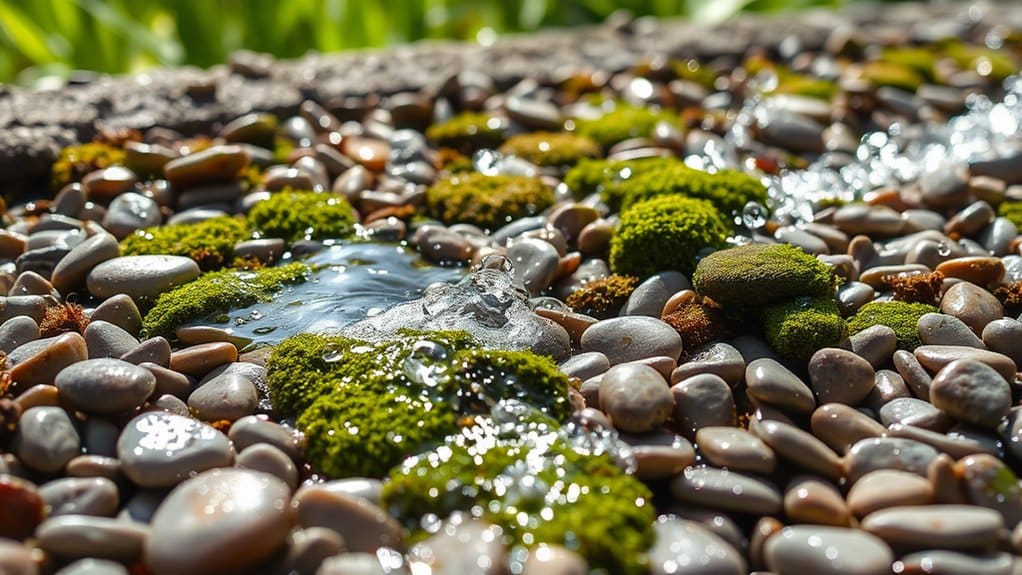
Removing organic stains on resin-bound gravel requires swift action and proper methods. Moss, algae, and tree sap can become deeply rooted if left untreated, making them harder to shift later on. The best approach is to deal with stains as soon as you spot them. For moss and algae, a specialist organic cleaner from your local DIY shop works well – much like treating a patio or driveway. Regular maintenance, including weekly sweeping, helps prevent moss buildup and reduces the risk of slippery surfaces. Tree sap needs a bit more effort, but washing-up liquid mixed with warm water often does the trick. Regular sweeping, particularly during autumn when leaves fall, stops organic matter from settling and helps prevent health and safety risks from slimy surfaces. A yearly pressure wash keeps the surface clean and maintains its appearance without damaging the resin bonds.
Treatment Methods Overview
Organic stains on resin-bound gravel, such as moss, algae and tree sap, can be tackled with several proven methods.
Start with a diluted mild detergent or specialist cleaner with anti-algae properties, using a stiff brush to work it in. For stubborn marks, try a branded moss and algae killer from your local DIY shop, but do check it’s suitable for your surface.
Whilst bleach or oxalic acid might shift particularly tough stains, always test these on a small, hidden patch first.
Regular maintenance with a stiff broom and occasional light pressure washing works brilliantly for prevention. Think of it like cleaning your patio – little and often keeps things looking smart.
Prevention Strategies Explained
Keeping your resin-bound gravel surface pristine requires prevention rather than cure. For best results, maximise sunlight by trimming any overhanging branches, as this naturally deters moss and algae.
Sort out proper drainage straightaway to stop water collecting, which would otherwise encourage unwanted growth. A quick sweep and gentle pressure wash every few weeks will shift loose debris before it becomes a problem.
It’s worth applying moss and algae treatments early on – much like treating your garden fence before it rots. Keep an eye out for trees that drop sticky sap, particularly in summer, and clean any drips promptly to avoid lasting marks.
These simple steps will help maintain your gravel’s smart appearance.
Removing Mineral and Rust Stains
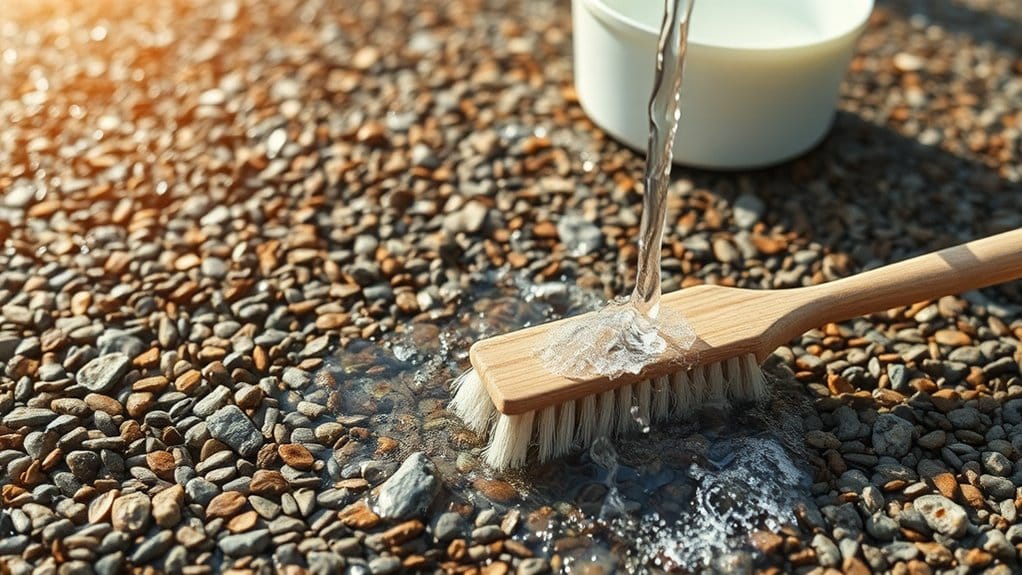
Mineral and rust stains on resin-bound gravel are a common nuisance for UK homeowners.
These pesky marks typically occur when natural iron in stone aggregates or metal contaminants react with moisture. Whether it’s that rusty garden furniture or mineral-rich groundwater causing the problem, these stains need proper treatment to avoid permanent marking.
Think of these stains like tea marks on a white tablecloth – the longer they’re left, the harder they’re to shift.
Different rust and mineral stains need different approaches, but they’re all manageable with the right cleaning method. The key is spotting them early and tackling them properly, rather than letting them set into your driveway or garden path.
Identifying Mineral Stains
Rust stains are a typical problem on resin-bound gravel, showing up as reddish-brown marks across the surface.
These marks commonly appear when iron within the stones oxidises, particularly visible on lighter gravels.
To spot these stains, simply look at your surface in daylight for any rusty patches.
The iron causing these marks might come from the stones themselves, bits of metal left behind, or even acid rain.
You’ll often find worse staining in areas where water pools, as dampness speeds up rusting.
Spotting these stains early means you can tackle them before they become a real eyesore and keep your gravel looking smart.
Worth checking regularly, especially after wet weather, when stains are most likely to develop.
Treatment Methods Overview
Tackling stains on resin-bound gravel is straightforward with proper treatment. For rust stains, specialist cleaners like Stontex Rust Off or Polybound’s Rust/Iron Remover work effectively. Simply apply undiluted, scrub with a nylon brush and rinse thoroughly.
| Cleaning Product | Key Features |
|---|---|
| Stontex Rust Off | Nonacidic gel, effective removal |
| Rust/Iron Remover by Polybound | Acid-free, pH-neutral |
To prevent rust, select aggregates with minimal iron content and clean regularly. Much like caring for a patio, consistent maintenance prevents stubborn stains from setting in, keeping your resin-bound surface looking fresh.
Removing Cement or Concrete Marks
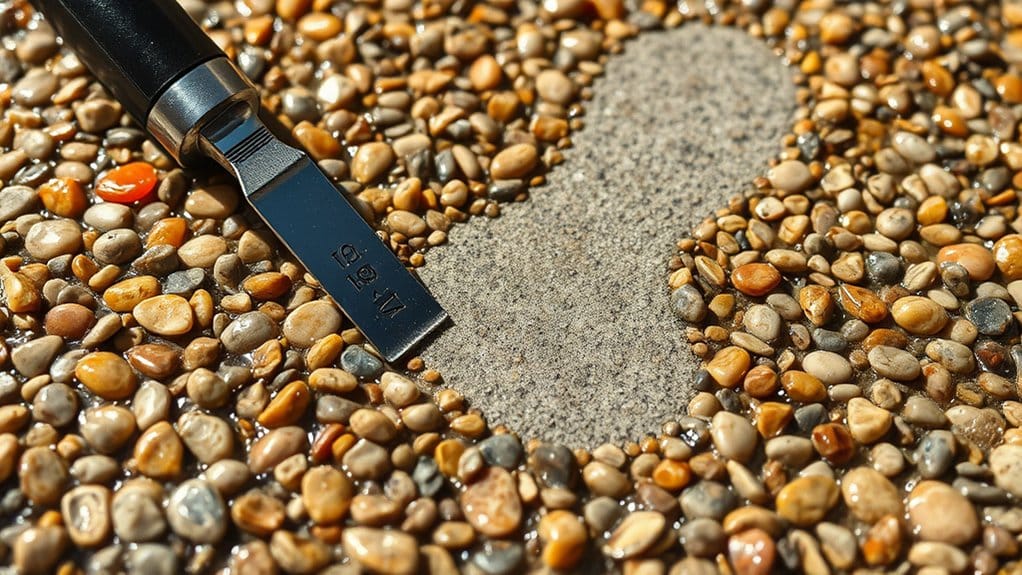
Removing cement or concrete marks from resin-bound gravel needs swift action to avoid permanent damage.
Diluted hydrochloric acid works well, but take care as it can harm the resin and stones if misused. First, test any cleaning solution on a small, hidden spot. Shop-bought cement removers offer a reliable alternative and are designed for this task.
Keep acid contact brief and wash thoroughly with clean water afterwards to remove all traces.
For light cement dust, warm water and mild soap should suffice – steer clear of harsh scrubbing products. The key is to tackle the problem quickly with the right cleaning materials.
Cleaning Tools and Techniques
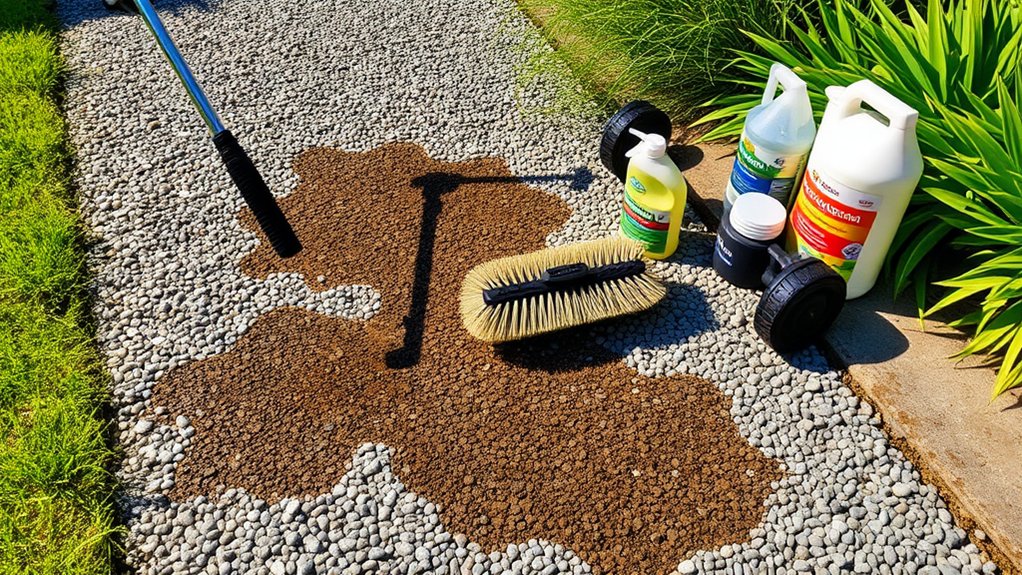
Essential tools for resin-bound gravel cleaning include a stiff-bristled broom and gentle cleaning materials.
Start by sweeping loose debris, then tackle light stains with a soft sponge or cloth dampened with white spirit or cooking oil.
For stubborn marks, a specialist rotary cleaner like the Whirlaway works best.
Don’t use pressure washers, as they’ll damage the resin bonding. Simply rinse with a garden hose on medium pressure to finish.
Regular cleaning keeps your driveway or path in top condition.
Routine Cleaning Tips
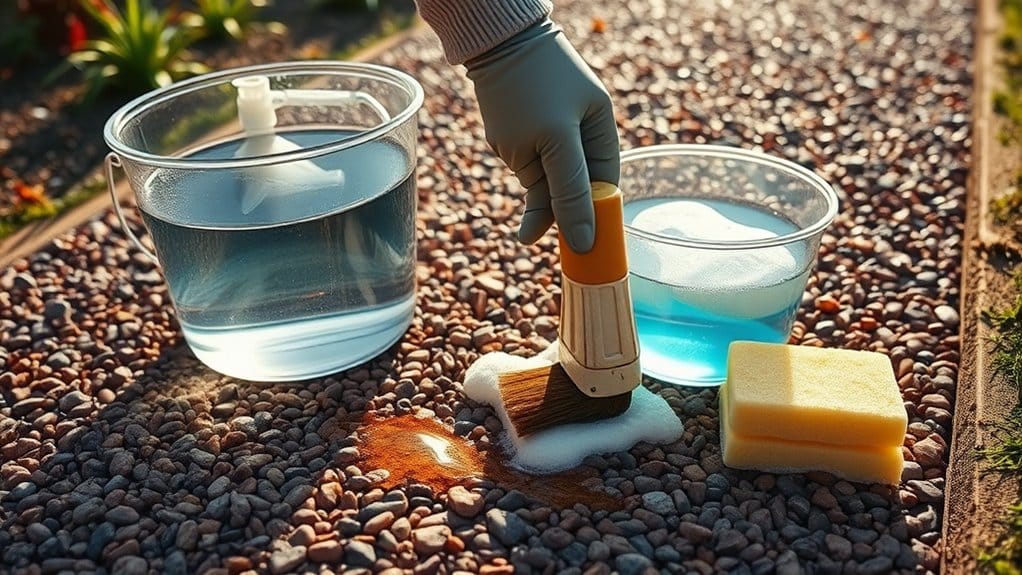
Regular maintenance keeps resin-bound gravel in top condition.
Give your gravel a weekly sweep to clear leaves and debris before they settle. Follow up with a gentle rinse, keeping your garden hose at least 20cm from the surface to protect the resin bonding.
Twice yearly, or when visibly dirty, use a pressure washer for a thorough clean.
Clean during dry spells to ensure proper drying and prevent moss build-up. For tough marks like oil spots or bird droppings, apply a gentle household cleaner, rinse well, and don’t let organic matter sit about – those autumn leaves can leave nasty stains if left too long.
Stick to these basic cleaning habits, and your gravel will stay smart and serviceable.
Preventing Stain Absorption
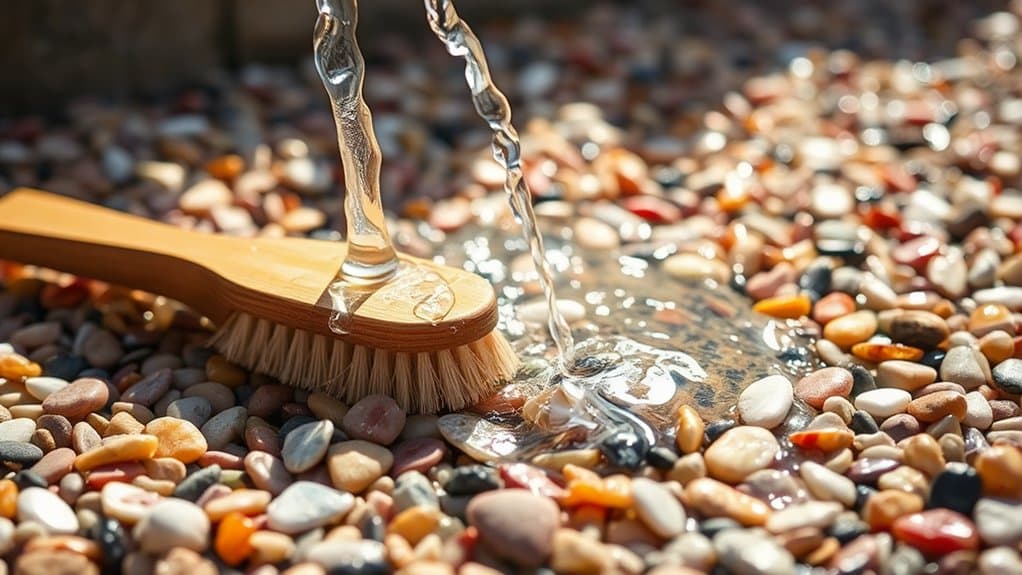
Simply seal your resin-bound gravel with a quality sealant to prevent staining.
Tackle any spillages straight away, whether it’s oil, wine or garden debris.
Regular sweeping and the occasional rinse with clean water will keep your surface pristine and ward off discolouration.
It’s far easier to prevent stains than to remove them later.
Immediate Spill Cleanup
Acting swiftly when spillages occur on resin-bound gravel is crucial to prevent staining and surface damage.
First, grab kitchen roll or cloths to soak up as much of the spill as you can. For minor spills, simply flush the area with water.
Tough stains need a mix of warm water and mild washing-up liquid worked into the affected spot. Don’t wait for rain to do the job – it won’t.
Quick action keeps your gravel looking smart and prevents lasting marks. Check your surface regularly to spot any issues early on.
Regular Surface Maintenance
Regular sweeping is vital for resin-bound gravel maintenance – aim to sweep once a week to prevent debris build-up.
Use a stiff-bristled broom in circular motions to properly lift dirt rather than push it about.
When washing, stick to cool or lukewarm water and pour from at least 20cm above the surface to protect the resin bonding.
Skip harsh cleaning products, as these can harm the material.
A bit of routine care will keep your gravel surface looking smart and prevent stubborn staining – much like keeping on top of the washing up rather than letting it pile up in the sink.
Protective Sealant Application
A protective sealant guards your resin-bound gravel against stains whilst enhancing its looks. Quality sealants keep moisture and oil at bay, maintaining your surface’s clean appearance.
Before applying, ensure your surface has fully cured and is spotless for proper bonding. Spread evenly using a rubber grout trowel or squeegee, then back-roll with a short pile roller to tackle any small holes. You might need a second coat for full protection.
Top up every 1-3 years, and opt for UV-resistant sealants to keep colours fresh. This bit of maintenance now saves hassle later.
Using Pressure Washers Safely
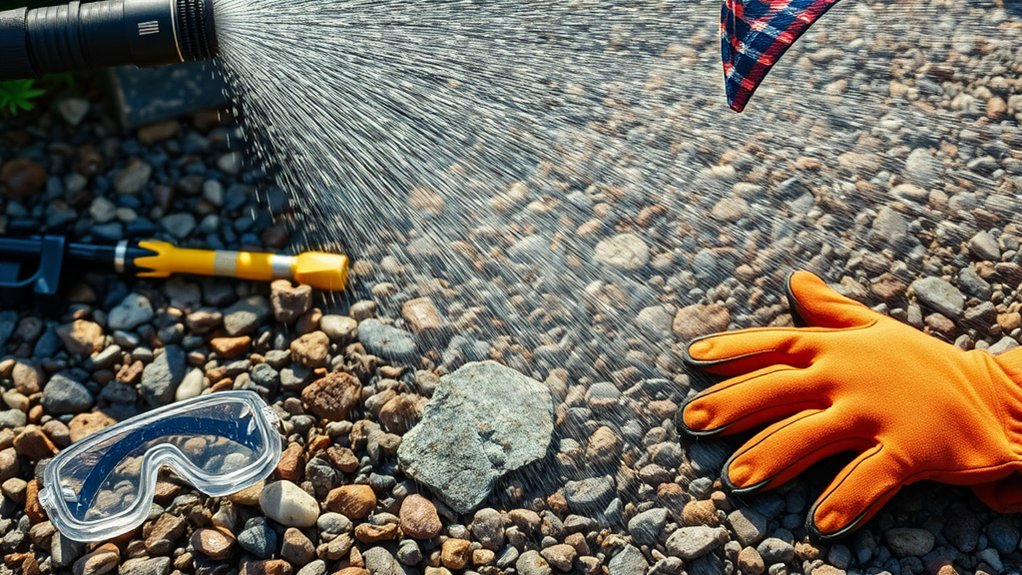
Safe Pressure Washing for Resin-Bound Gravel
Proper pressure washer use keeps your resin-bound gravel in top condition. Mind these key settings:
| Aspect | Recommended Setting | Tips |
|---|---|---|
| Pressure Settings | 1,200 – 1,500 psi (80 – 100 bar) | Never exceed 150 bar to avoid damage |
| Nozzle Selection | 25° or 40° wide-angle nozzles | Maintain 20 cm distance from surface |
| Cleaning Technique | Steady sweeping motion | Move constantly, like painting a fence |
| Water Temperature | Cool to lukewarm | Hot water risks surface softening |
Choosing the Right Cleaning Products
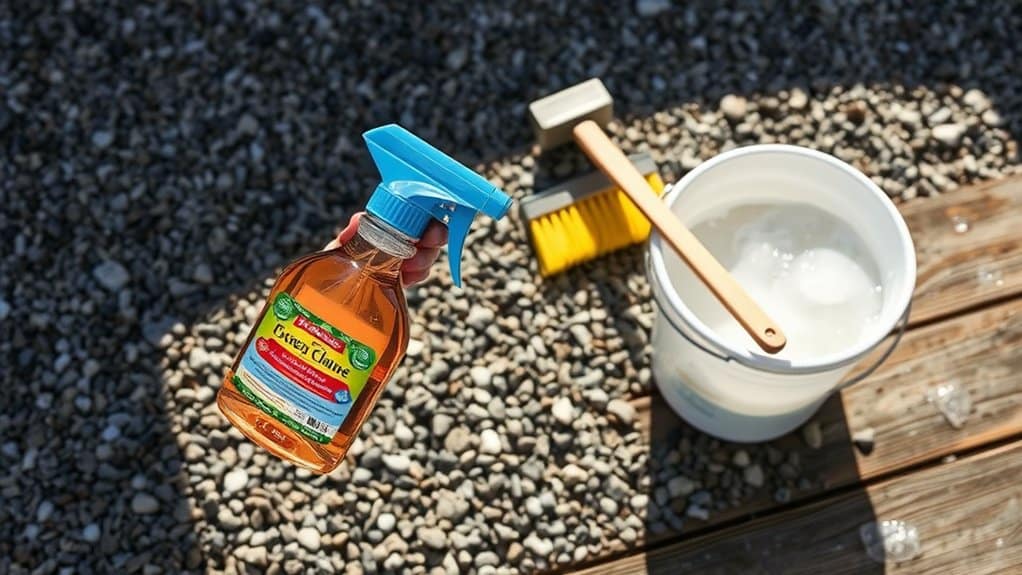
Choosing the right cleaning products for resin-bound gravel is straightforward when you know what to look for.
pH neutral cleaners, such as Benz Bio Cleanze or Lightning Cleanze, work best for everyday cleaning and won’t damage the surface. Much like testing hair dye on a small patch of skin, always try cleaners on a discrete area first.
For tough marks, diluted oxalic acid can shift stubborn stains, but do wear proper safety gear.
Grease marks? A bit of white spirit will sort them out, though it’s best kept for spot cleaning rather than regular maintenance.
Specialist resin cleaners from your local DIY shop are worth the investment – they’re designed specifically for the job and won’t harm your driveway or patio.
Always check the manufacturer’s guidelines before using any new product on your resin surface.
Regular Maintenance for Longevity
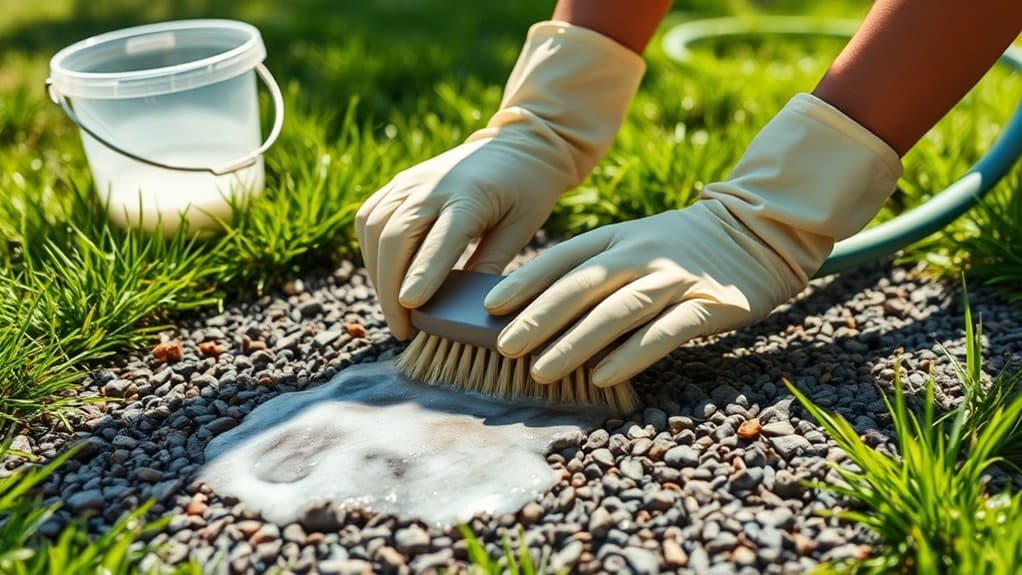
Regular maintenance is crucial for your resin-bound gravel’s longevity. Check monthly for signs of wear or damage, particularly after harsh weather.
Sweep away leaves, twigs and rubbish regularly – this is especially important during autumn when fallen leaves are abundant.
Give the surface a proper clean every few months using gentle soap and water, avoiding harsh chemicals that might damage the resin.
Deal with spills and stains straight away using a damp cloth to prevent permanent marks.
Keep an eye on drainage, ensuring water flows properly through the surface, particularly important given the UK’s wet climate.
Tackle any moss or weeds as soon as they appear, as they can weaken the surface over time.
The more attention you give your resin-bound surface, the longer it will last.
A well-maintained driveway or path can easily last 15-20 years, making it a worthwhile investment for your property.
Frequently Asked Questions
Can I Use Bleach to Clean Resin-Bound Gravel?
Bleach isn’t ideal for resin-bound gravel. Whilst it might clean effectively, it risks damaging the resin bonds and can be harmful to your garden’s ecosystem. Better options include white vinegar mixed with water or a bicarbonate of soda solution – both are gentler yet effective. To keep your gravel looking top-notch, sweep regularly and tackle spills straightaway rather than letting them set. If you’ve got tough stains, pop down to your local DIY shop for a specialist resin-friendly cleaner.
How Often Should I Clean My Resin-Bound Gravel?
Regular maintenance of your resin-bound gravel is essential. A weekly sweep and rinse keeps the surface looking smart, whilst a thorough clean every 3-6 months maintains its quality. Such routine care not only preserves the driveway’s appearance but also extends its lifespan considerably.
Will Vinegar Harm Resin-Bound Surfaces?
Vinegar is typically safe for resin-bound surfaces when used properly. The mild acidic properties make it suitable for general cleaning, though some homeowners prefer gentler options like bicarbonate of soda for stubborn marks. For best results on your driveway or patio, dilute the vinegar with water and test on a small, hidden area first.
Can I Use a Steam Cleaner on Resin-Bound Gravel?
Avoid using steam cleaners on resin-bound gravel as they can damage the surface. Instead, use a pressure washer on a low setting or brush with soapy water. These gentler methods effectively clean whilst preserving the integrity of your driveway or path. If stubborn stains persist, consult your installer for approved cleaning solutions.
What Should I Do if Stains Persist After Cleaning?
Stubborn stains? First, focus on prevention – regular sweeping and immediate spot treatment are essential. For existing marks, opt for UK-approved specialist cleaners suited to your surface type. Test any new product on a small area first to avoid damage. Common household items like white vinegar or bicarbonate of soda often work brilliantly on persistent stains, particularly on kitchen worktops or bathroom tiles.
Conclusion
Keep your resin-bound gravel in top condition by following these cleaning methods. Regular maintenance prevents difficult stains from setting, saving time and effort in the long run. Should tough marks appear, apply the suggested techniques promptly. Proper care ensures your outdoor surface remains practical and smart-looking throughout the seasons.
